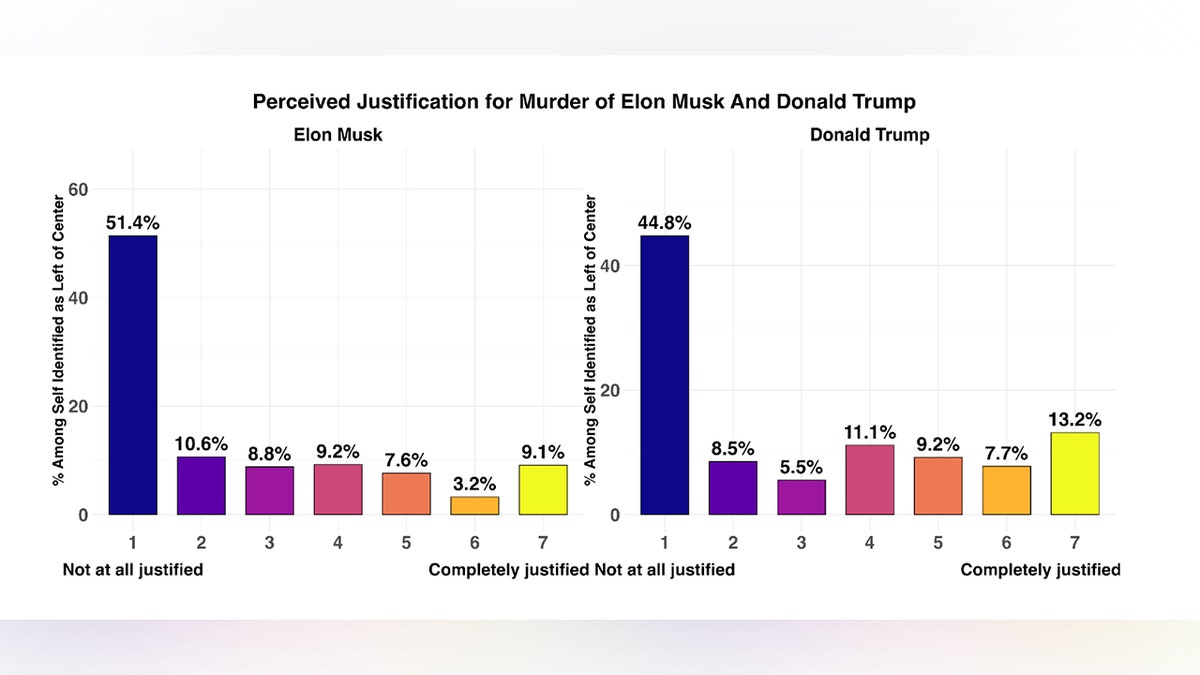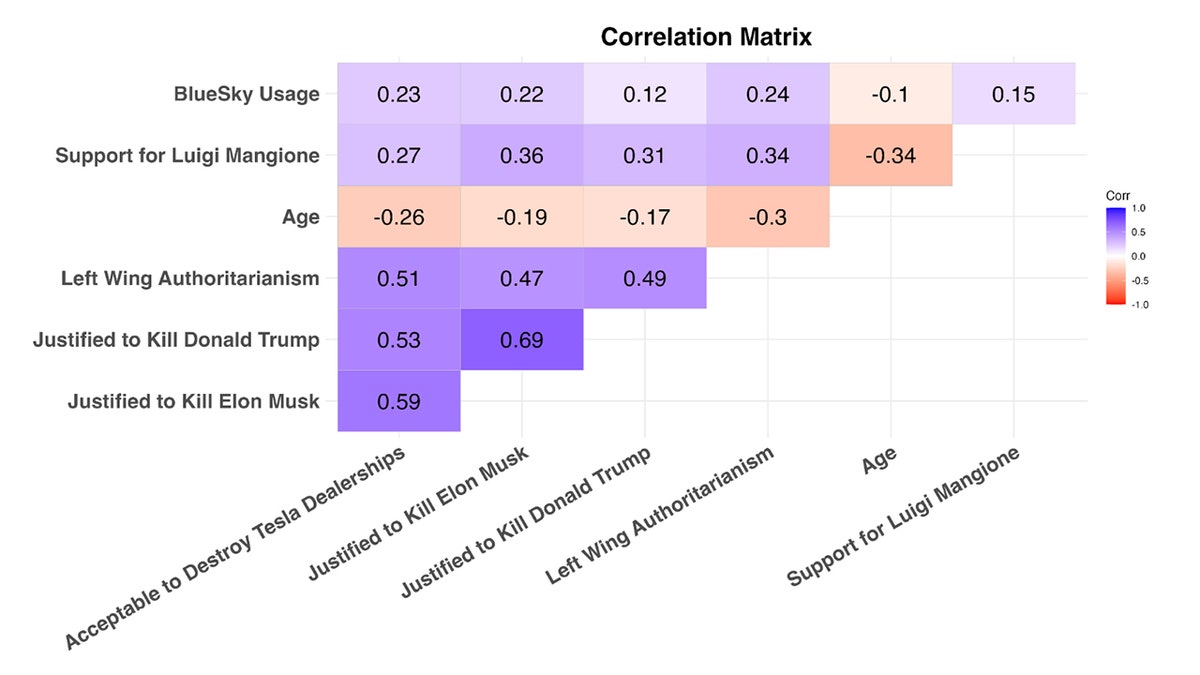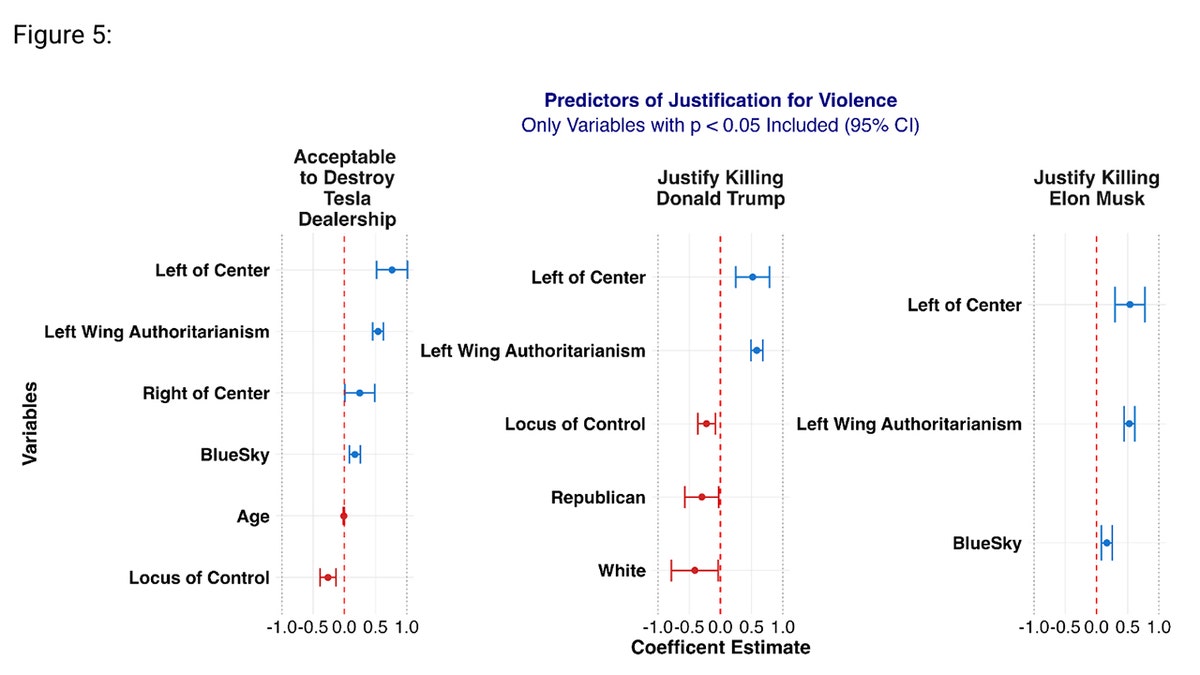A new concerning study indicates that there is a rising trend of violent political language online, such as advocating for the assassination of prominent figures like President Donald Trump and Elon Musk. This behavior is becoming more common, notably among individuals leaning towards the left side of the political spectrum.
According to a report by the Network Contagion Research Institute (NCRI), an increasing number of individuals are justifying and even celebrating violence as a means of advancing political agendas and a distorted concept of social equity. This alarming shift seems to have gained momentum in recent times.
“Actions that were previously deemed culturally inappropriate are now being normalized,” remarked Joel Finkelstein, the main author of the report, in a statement to Fox News Digital. “There is a distinct transition occurring – with the glorification of violence, elevated endorsement, and evolving standards – all coalescing into what we identify as ‘assassination culture.’”
The NCRI study traces the cultural shift back to the assassination of UnitedHealthcare CEO Brian Thompson by Luigi Mangione in December 2024. What followed, researchers say, was a viral wave of memes that turned Mangione into a folk hero.
According to the study, these memes have sparked copycat behavior targeting other figures associated with wealth and conservative politics.
“Trump represents the perfect target for assassination culture. He’s powerful, he’s rich and he’s provocative,” said Finkelstein to Fox News Digital. “That puts him on the highest shelf for those who glorify political violence.”
“Trump represents the perfect target for assassination culture. He’s powerful, he’s rich and he’s provocative. That puts him on the highest shelf for those who glorify political violence.”
When asked whether destroying a Tesla dealership was justified, nearly four in 10 respondents agreed it was, to some degree. Among self-identified left-of-center participants, support for vandalism and property damage was significantly higher.
“Property destruction wasn’t just an outlier opinion, it clustered tightly with support for political assassinations and other forms of violence,” said Finkelstein. “This points to a coherent belief system, not just isolated grievances.”

Among left-of-center respondents, a large share rated the murder of Trump and Musk as either “somewhat” or “completely justified,” according to this histogram. The chart highlights the skew in support for political violence along ideological lines, with far-left participants scoring highest across all metrics. (Network Contagion Research Institute)
“Tesla has become a stand-in for broader frustrations about capitalism, tech power and conservative politics. Burning down a dealership isn’t just a protest, it’s a performance, a signal of belonging to a radical in-group.”
Finkelstein said that while some level of violent sentiment exists on the right, “What we found was a statistically higher endorsement of political murder on the left, 41% more than among right-leaning participants.”
The report singles out BlueSky, a social media platform favored by progressive users, as a major amplifier of extremist ideation.
“BlueSky was modeled as a safe alternative to Twitter for the left, but what it’s become is an extremist platform,” Finkelstein said. “It functions today much like 4chan or Gab once did for far-right ideologies. These platforms are now lead indicators of violent real-world trends.”

This correlation matrix shows that support for assassinations, property destruction and Mangione are all tightly linked, forming a belief system NCRI calls “assassination culture.” The study finds that left-wing authoritarianism was the strongest predictor for all categories of political violence. (Network Contagion Research Institute)
According to NCRI’s open-source analysis, BlueSky saw a spike in engagement on posts referencing Mangione, Trump and Musk, crossing over 200,000 posts and 2 million engagements in just months. Reddit currently hosts pro-Mangione communities with tens of thousands of members.
Finkelstein believes the psychological roots of “assassination culture” are a mix of ideological radicalism and feelings of powerlessness, particularly in the aftermath of electoral losses.
“When people feel like they have no say, no future and no leadership offering vision, they become susceptible to radical ideation,” he said. “And that’s when the memes turn into permission structures for real violence.”

Multivariate regression analysis reveals that far-left ideology, the use of BlueSky and a sense of powerlessness (external locus of control) are the leading predictors of support for political violence. The chart breaks down which psychological and demographic traits most strongly align with justifying the murder of Musk and Trump or attacks on Tesla dealerships. (Network Contagion Research Institute)
A key predictor identified in the study is external locus of control, which is the belief that one’s life is governed by outside forces.
“Combine that with extreme partisanship, and you get an explosive mix,” Finkelstein said.
Finkelstein does not believe censorship will end “assassination culture,” but strong leadership just might.
“We are not an anti-free speech organization,” said Finkelstein. “But we know what a threat is. And what’s happening online on platforms like BlueSky represents a significant threat to American democratic values. If leaders on the left explicitly condemn these trends and reassert moral norms, they can dismantle this culture quickly,” he said. “It’s about reminding people there is a future worth striving for that doesn’t involve glorifying political violence.”
“It’s about reminding people there is a future worth striving for that doesn’t involve glorifying political violence.”
The NCRI report ends on a sobering note: The normalization of assassination ideation is already spilling into real-world violence. Whether it’s attacks on Tesla dealerships or assassination attempts on public officials, the NCRI warns that political violence is no longer fringe but culturally fashionable in some corners of the internet.
















